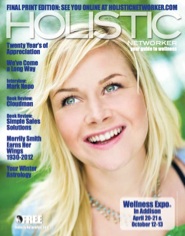by Allison Ellis
If it’s good for you, isn’t it good for you all the time?
In Part I of our series, Eating with the Season, we discussed Traditional Chinese Medicine (TCM) Nutrition principles, stating that the foods we eat all have specific energetic properties (cooling, heating, descending, dispersing, etc.) and can strongly affect specific organs. Eating foods with energetic properties that compliment the season of year and that support the organ of that season, year after year, has a direct impact on the quality of our life and even our longevity.
Readers of the Holistic Networker already know that a body struggling to regenerate itself for decades on glazed donuts (even if they are “fortified with 10 essential vitamins and enhanced with green tea extract”) and microwave TV dinners (even if they are “low-fat, rich in omega-3s, and naturally flavored with essence of goji berries”) is going to have a more difficult go at it than one fed a real, whole-food diet. However, you may be unaware of the fact that foods considered wonderful for the body at one time of year would be strongly advised against or even considered harmful at another time of year.
In Tune with Nature
We also discussed in Part I that the human body, even if we are unaware of it, responds to the seasons just as other animals and plants. We identified similar seasonal patterns in trees and human beings: in autumn the energy of a tree retreats from the branches causing leaves and fruit to fall; and in winter, the energy is in its greatest retraction deep in the roots. According to TCM principles, the kidneys are the roots of the human body and where the energy is greatly concentrated in winter. During the winter, our activities and the food we eat should support and protect that energy storage to properly prepare us to move into the next season—spring.
In the Chinese calendar, the New Year is not a fixed date, but is on the second new moon after the winter solstice, and this year it occurred on February 18. The timing of this celebration of the New Year is no accident and is actually quite appropriate…it is when the energy for the earth and all its creatures is getting ready to burst forth from its winter hibernation.
Springtime = Liver Time
While the focus in winter is on energy storage and the kidneys, the focus in springtime is cleans- ing and the organ is the liver. From a Western perspective, the liver is a brownish-red organ that performs over 1,000 known tasks including filtering and storing blood, producing proteins, making and storing vitamins, metabolizing carbohydrates and lipids, storing nutrients, aiding in digestion, and filtering toxins. From a TCM perspective there is no separation of physical health and mental health, and every organ is closely associated with and affected by particular emotions. The liver, called the “seat of happiness”, is responsible for creative energy and “will”, and is strongly affected by anger. When a person is balanced and happy, energy will flow freely through the liver and body, furthering health. When a person is angry and blocked, or eating an improper diet, the energy of the liver will stagnate, causing a wide range of unpleasant issues including: frustration, depression, irregular menstruation, digestion problems, abdominal distention, lumps in the neck, breast, or groin, and many more. All to say…it’s a great idea to take care of your liver and this is the season to really nurture it!
Caring for the Liver
The liver naturally tends toward “heat” because of the tasks it carries out. When filtering blood, it stores excess toxins to protect the rest of the body, but when the burden is heavy, the liver itself can become damaged. “Dampening” and “heating” foods are to be avoided in spring. This list includes:, caffeine (excessive coffee and black tea), chocolate, sodas , alcohol, sugar, dairy, spicy and fried foods, iced drinks, frozen foods, soy and flour products, heavy and salty foods.
Foods that are light, cooling and detoxifying support the liver in spring, and this list includes: dark leafy greens such as chard, kale, mustard, collard, young spring greens and sprouts, watercress, dandelion, pungent herbs such as basil, fennel, rosemary, dill and bay leaf, lemon / lemon juice, young beets and carrots, flaxseed oil, white meats (except turkey which is heating to the liver), a wide variety of legumes and whole grains, and some fresh fruit (not to excess).
Beverages that benefit the liver: green tea, dandelion tea, chamomile tea (to be avoided if you are allergic to ragweed), chrysanthemum tea (wake up in the morning and drink a glass of room temperature water with a squeeze of lemon to stimulate liver “chi” flow).
Cleansing and Detoxing
Wow, those two words are the hype now! You see entire aisles and end-caps at the grocery stores with boxes of pills and powders to help you cleanse, find more energy, and improve your health.
Cleansing and detoxing—more or less interchangeable words—have come to the forefront in alternative health care—and for good reason. Modern lifestyle and diet in particular are loaded with toxic opportunities which we seize in abundance. In many cases, the natural work of detoxing done by a diet rich in leafy greens and other cleansing foods just can’t get the job done.
If fasting and/or cleanses are recommended, spring is the ideal time of year to do so. TCM practitioners will usually caution against extreme fasts and cleanses; and unless it is for a personal, spiritual pursuit, water-only fasts are not recommended. There are herbal formulas used in TCM to aid in liver cleanses (and other organ cleanses), and specific diets that are to be used during the cleanse to support the body. Depending on the person’s age, current health, and other factors, he or she may experience almost no side effects from a cleanse, some positive but unpleasant side effects that are a result of the cleanse (called a healing crisis), or if a person is already very weak, a cleanse can cause acute problems to surface which would require attention. As with anything that will strongly effect the body, it is wise to consult with a professional (a L.Ac. or O.M.D. are a few examples) who understands the cleanse or detox you want to undertake rather than go it alone…and what about summer?
Whether or not you choose to cleanse in spring, eating a diet rich in the foods from the lists in this article should have your liver “chi” happily flowing into summer at which time you should eat.
“Ah, what to eat in summer?” you ask. Look in your next edition of the Holistic Networker for Part 3 of Eating with the Season.
Allison Ellis is a Certified TCM Nutritionist and can be reached at www.alliechee.com
About Allie Chee
Allie is a certified TCM Nutritionist and author of New Mother: Using a Doula, Midwife, Postpartum Doula, Maid, Cook, or Nanny to Support Healing, Bonding, and Growth










